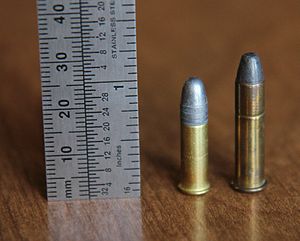.22 Winchester Rimfire
 From Wikipedia the free encyclopedia
From Wikipedia the free encyclopedia
The topic of this article may not meet Wikipedia's notability guidelines for products and services. (February 2023) |
| .22 Winchester Rimfire | ||||||||||||||||
|---|---|---|---|---|---|---|---|---|---|---|---|---|---|---|---|---|
 .22 Long Rifle (left) and .22 Winchester Rimfire (right). | ||||||||||||||||
| Type | Rifle | |||||||||||||||
| Place of origin | United States | |||||||||||||||
| Production history | ||||||||||||||||
| Designed | 1890 | |||||||||||||||
| Produced | 1890–present | |||||||||||||||
| Specifications | ||||||||||||||||
| Case type | Rimmed, straight | |||||||||||||||
| Bullet diameter | .2285 in (5.80 mm) | |||||||||||||||
| Neck diameter | .2435 in (6.18 mm) | |||||||||||||||
| Base diameter | .2455 in (6.24 mm) | |||||||||||||||
| Rim diameter | .300 in (7.6 mm) | |||||||||||||||
| Rim thickness | .050 in (1.3 mm) | |||||||||||||||
| Case length | .965 in (24.5 mm) | |||||||||||||||
| Overall length | 1.180 in (30.0 mm) | |||||||||||||||
| Rifling twist | 1-14 in (360 mm) | |||||||||||||||
| Primer type | Rimfire | |||||||||||||||
| Maximum pressure | 19,000 psi (130 MPa) | |||||||||||||||
| Ballistic performance | ||||||||||||||||
| ||||||||||||||||
| Source(s): Barnes & Amber 1972 | ||||||||||||||||
The .22 Winchester Rimfire (commonly called the .22 WRF or .22 Remington Special) is an American rimfire rifle cartridge.[1]
History
[edit]Introduced in the Winchester M1890 slide rifle, it had a flat-nose slug, and is identical to the .22 Remington Special (which differed only in having a roundnosed slug).[2] It uses a flat-based, inside-lubricated bullet, which differs from the outside-lube heeled bullet of the .22 Short, .22 Long, .22 Long Rifle, and .22 Extra Long cartridges.[2]
When introduced, the .22 WRF "was the first notable improvement in the killing power" over the .22 LR,[3] and was able to kill cleaner at up to 75 yd (69 m). It is somewhat less accurate than the .22 LR[2] and is most suited to hunting small game such as rabbits or prairie dogs.[3]
Shortly before World War II, propellants were developed that greatly increased the effectiveness of the .22 LR. These new "High Velocity" loadings offered a nearly 300 ft/s (91 m/s) increase in velocity over the original 1,050 ft/s (320 m/s) .22 LR load.[citation needed] This increase in power of the smaller round, coupled with its cheaper price and sheer number of rifles already owned in .22 LR, effectively killed the .22 WRF.[citation needed]
A variety of Winchester, Remington, and Stevens single-shot and repeater rifles were offered from 1890 onward, but new rifles are not made for this cartridge. .22 WRF ammunition is periodically offered by commercial makers for use in the old guns.[2] It can be fired in any rifle chambered for the more powerful .22 WMR.[2] The shorter WRF cartridge may be limited to single shot use in WMR rifles since it may not feed from WMR-length magazines, depending on design.
Dimensions
[edit]Cartridge dimensions as specified by ANSI/SAAMI.[4]

See also
[edit]References
[edit]Notes
[edit]- Barnes, Frank C., ed. by John T. Amber. ".22 Winchester Rimfire", in Cartridges of the World, pp. 275 & 282-3. Northfield, IL: DBI Books, 1972. ISBN 0-695-80326-3.
External links
[edit]